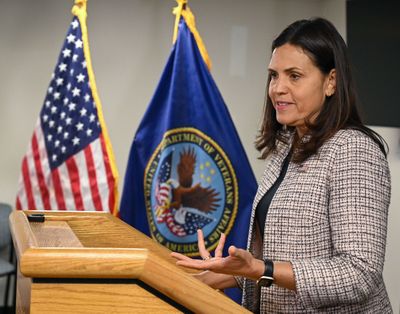VA remains committed to controversial computer system, says Veterans Affairs official in Spokane visit

In her second visit to Spokane in sixth months of office, Deputy Veterans Affairs Secretary Tanya Bradsher said the federal government remains committed to the VA’s controversial electronic health records system unveiled at Mann-Grandstaff Medical Center.
In meetings at the hospital Monday morning, Bradsher heard complaints and some notes of progress about the Cerner Oracle electronic health record system, which was implemented at Mann-Grandstaff in 2020. Plans to expand the system across the nation were halted following reports of the system frequently crashing, mixing up medications and causing dangerous delays in treatment.
“What we learned is that they’re seeing some down times that we’re not seeing in headquarters. So we want to really investigate and figure out what those are,” she said. “That’s very helpful. We’re hearing some improvements, but we still hear just some of the frustrations.”
The second-highest official in the VA, Bradsher was appointed to her post by President Joe Biden last year and visited Mann-Grandstaff last October in her first 30 days on the job. While she familiarized herself with the hospital in that initial visit, this check-in six months later was to test the waters before reintroducing the Cerner Oracle rollout sometime next year.
The so-called “reset” announced a year ago halted more VA hospitals from adopting the electronic health record system. But as the federal investigation continued, patients and employees at Mann-Grandstaff have been left in limbo as to whether the system will be tweaked or see another overhaul.
There is no Plan B, Bradsher said Monday. Veterans Affairs remains committed to the Cerner Oracle system.
“Right now, we don’t have another third health care record that we’re looking at,” she said. “We need to have an integrated health care record that we can move to right now. We’re still focused on Oracle Health. And we’re going to put our resources in on making sure that we have the health care record that our clinicians need and deserve, and so we have some work to do.”
While the system is running smoother than it has in the past, there need to be “a lot more” improvements before the reset can end and it is adopted nationwide, Bradsher said. That rollout will be announced next year, but Bradsher declined to give a more specific timeline.
In a statement, Dr. Neil Evans, who leads the effort to coordinate the VA’s implementation of the new electronic records system, said the decision will be decided by leadership “based on the readiness” of the system and each medical center.
“Part of the analysis is looking at the ‘reset results scorecard,’ which is a collection of metrics that are being analyzed. The rest of 2024 will be spent analyzing what it will take to restart, and we anticipate in FY 2025 we will begin restarting, and then be another year before anything goes live,” Evans said in a statement provided Monday.
Her Spokane visit is the first of a weeklong trip to all VA hospitals that have implemented the system, except for Lovell Federal Healthcare Center in North Chicago, Illinois.
“What we need to develop and have for our clinicians is a health care record that allows our clinicians to focus on taking care of the veteran,” Bradsher said. “And so we just need to continue to optimize the electronic health care record for our clinicians.”